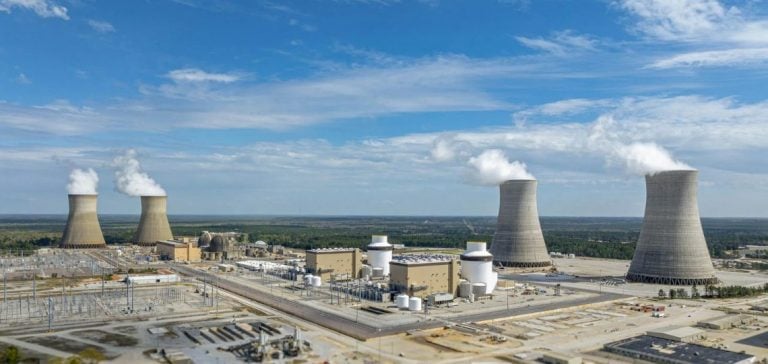Recent advances in Georgia’s energy sector, notably the completion of units 3 and 4 of the Vogtle nuclear power plant, mark a significant turning point in the state’s energy transition.
For the first time, electricity generation from clean energy sources will surpass that from fossil fuels, with nuclear power accounting for 37% of Georgia’s energy mix by May 2024.
This development comes at a time when the need to reduce carbon emissions and increase the share of renewable energies is becoming ever more pressing.
Transforming the energy mix
The impact of the Vogtle power plant on Georgia’s energy mix is undeniable.
Between January and May 2024, total electricity production reached a record level of 55,634 gigawatt hours (GWh), an increase of 12.3% compared to the same period in 2023.
This increase is mainly attributed to the rise in nuclear production, which enabled clean energy to account for 47% of the state’s energy mix.
This change underlines the growing importance of nuclear power in Georgia’s decarbonization strategy.
The new units at the Vogtle plant have not only increased power generation capacity, but also reduced the carbon intensity of the Southern Company’s energy system.
In 2024, carbon dioxide emissions per kilowatt-hour produced fell by 14% compared with 2023, from 440 gCO₂/kWh to 427 gCO₂/kWh.
This reduction in emissions is a key indicator of the positive impact that expanding nuclear capacity can have on the environment.
Financial challenges and construction delays
However, the expansion of the Vogtle power plant is not without controversy.
The project, initially budgeted at $14 billion, has seen costs soar to $35 billion, making it one of the world’s most expensive nuclear projects.
The cost of electricity generated by the new reactors is estimated at $10,784 per kilowatt-hour (KWh), a figure that raises concerns about the economic viability of nuclear power compared with other renewable energy sources, such as wind and solar, whose costs range from $1,000 to $1,500 per KWh.
Construction delays have also been a sticking point.
Units 3 and 4, which began construction in 2009, were only commissioned after almost 15 years of work.
These delays have not only led to cost overruns, but also to criticism of project management and the nuclear industry’s ability to deliver projects on time and on budget.
Long-term outlook
Despite these challenges, the impact of the new Vogtle units could be felt for decades to come.
With an expected lifespan of 60 to 80 years for these reactors, their contribution to clean energy production and carbon emission reduction could be significant.
However, critics point out that high costs and delays could deter future investment in the nuclear sector in the USA.
The completion of the Vogtle units could also influence the perception of nuclear power as part of the energy transition.
As pressure mounts to reduce carbon emissions, the plant’s ability to provide a stable, low-emission energy source could strengthen the case for nuclear power as an essential component of a decarbonized energy mix.
Conclusion on the future of energy
The evolution of Georgia’s energy mix, catalyzed by the expansion of the Vogtle plant, illustrates the challenges and opportunities associated with the transition to cleaner energy sources.
While costs and delays raise questions about the economic viability of nuclear power, the results in terms of reduced emissions and increased clean energy production are crucial elements to consider.
As the energy sector evolves, the ability to balance costs, sustainability and energy security will be critical to the future of energy in Georgia and beyond.






















